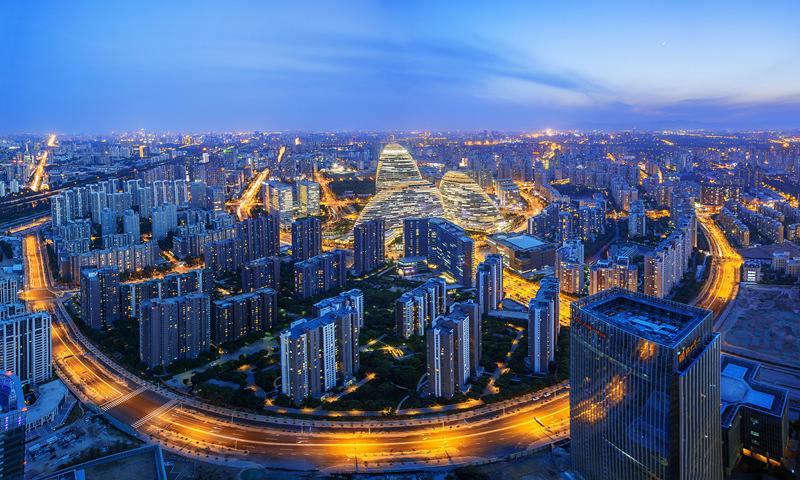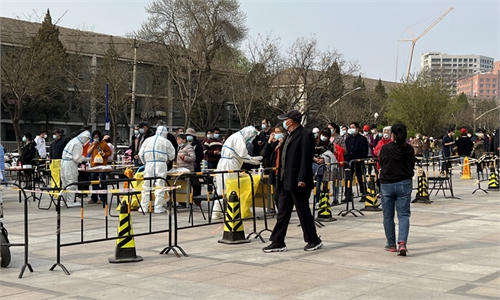Beijing warns of infection risks brought by imported goods, to start antigen self-testing

A view of Wangjing SOHO at dusk in Beijing Photo: VCG
Beijing health officials on Tuesday warned residents to remain cautious when buying goods imported from overseas, especially from countries with high COVID-19 infection risks, as the city faces a "complex and grave situation" amid yet another epidemic flare-up. Antigen self-testing has been added to supplement nucleic acid testing among quarantined people, officials said.
With the pandemic still serious outside the country and multiple outbreaks in various regions nationwide, Beijing is facing double risks brought by personnel inflows and imported goods, Li Ang, a spokesperson with the Beijing Health Commission, said on Tuesday at a press conference.
A total of 97 local cases have been reported in the past month in Beijing. Among them, a clothing store selling South Korean-style clothes in one of Beijing's most densely populated residential areas has drawn heated attention, as six of its staff members were found to have been infected in the past two days.
The clothing store is located at the SOHO Complex in Wangjing, home to many locals as well as South Korean residents. This cluster of cases is believed to be related to the clothing store, media reports said.
Wang Peiyu, a deputy head of Peking University's School of Public Health, told the Global Times on Tuesday that as the vast majority of regions in China have found positive cases, it is highly likely that the virus would spread to the capital via personnel flows, "especially the frequent exchanges with Beijing and Shanghai, where the Omicron variant is rampaging."
Given that Wangjing is a residential area where many South Korean people are gathered, the expert noted that the risk of virus imports via humans and goods from the neighboring country should also be considered.
Wang Guangfa, a Beijing-based respiratory expert, added that a recent study has shown that the Omicron variant survives for longer periods of time after it leaves the human body, which poses more risks to products that aren't on the cold chain, he told the Global Times on Tuesday.
To control the epidemic as soon as possible, the city has announced a slew of measures to increase the ability to detect potential virus carriers.
As China's Tomb-sweeping Day holiday comes to an end, and people conclude their outings and head back home, the municipal government has asked those returning to Beijing to take nucleic acid tests within 72 hours upon arrival, and said they should refrain from gathering activities within the first seven days after returning. Before getting the test results, people should work from home instead, officials said.
Beijing has also strengthened COVID-19 screening for people involved in nursing homes, schools and those dealing with imported goods. These groups of people will take at least one nucleic acid test per week.
Imported goods have become a key target. Apart from continued monitoring of cold-chain products, the city will carry out regular testing on imported fruits, clothing and other materials, as well as international mail.
Authorities stipulate that customs departments will store imported goods for at least seven days after conducting COVID-19 screening tests and disinfecting them unless they are in urgent need.
To increase the efficiency of detecting the virus, Beijing has asked people under quarantine to take antigen tests on their own as a supplement to the nucleic acid tests in the first few days of their quarantine, authorities noted.

